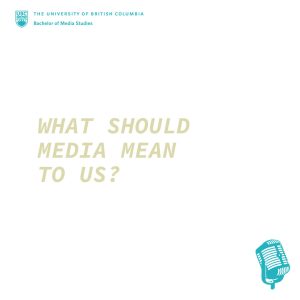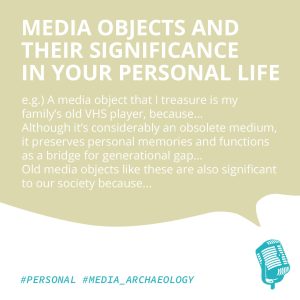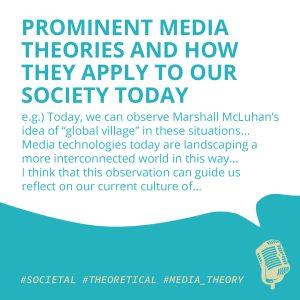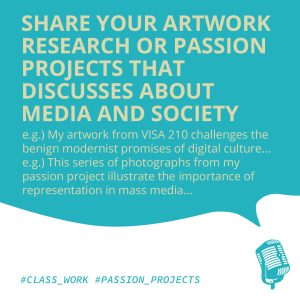As a UBC Bachelor of Media Studies (BMS) student, you are inquisitive and passionate about media, and learn and understand the impact of media in our society through interdisciplinary studies in media. You are media makers, artists, theorists, and thinkers with your own unique perspectives.
As such, the BMS program is very excited to announce that we’ve organized the inaugural M-DEA Talk: UBC Bachelor of Media Studies Public Speaking Competition event on April 6, 2022 (6pm – 8pm PST).
M-DEA Talk
At M-DEA Talk, we invite students to share a 4 minute to six minute speech about “What should Media mean to us?” This broader topic allows you to interpret and speak to it in your own way. It could be at a personal level (eg: personal stories, course work, experiences, interests, hobbies etc.), and/or at a societal and world level.
For example, are you a filmmaker, music maker, or creative writer? What are the topics or issues that you express, and matter to you? Or, did you learn about/discover an interesting finding in your academic studies that you’d like to share?
M-DEA Talk is a unique opportunity for you to share what you’re passionate about to a greater audience. As we know that we have students who study and practice multimedia formats, Speakers have the option to incorporate visual elements such as images and videos in their speech!
A year-end celebration of students’ learning, this event will bring together BMS students of all year-levels, and speech contestants will have the exciting opportunity to compete for the First, Second, and Third Place Prizes!
Sign up to be a Speaker by March 10, 2022!
Registration Details:
To sign-up to be a Speaker, please complete the form linked here.
Registration will be open between Thursday, February 24 and Thursday, March 10, 2022.
There is no registration fee.
Eligibility:
Contestants must be students who are currently enrolled at the University of British Columbia’s Bachelor of Media Studies program at the Vancouver campus.
Speech Competition Process:
After Contestants register through the above form, they will then be contacted by the BMS program to attend the 'Preliminary Audition' on either Wednesday, March 16 or Friday, March 18 where they will introduce themselves, share their interests, and share a brief outline and ideas for their speech - including if they will be incorporating any visual elements in their speech (see 'Event Format, Rules, and Regulations' tab for more information on incorporation of visual elements guidelines).
Following the completion of all auditions, we will contact Contestants who advance to the 'Final Event', and they will then have the opportunity to prepare and finalize their 4 minute to 6 minute speech, and present/compete at the 'Final Event.'
Preliminary Audition:
- Date: March 15, March 16, or March 17
- Time: TBD - will be scheduled according to the Contestants’ availability
- Venue: Virtually via Zoom
Final Event:
- Date: Wednesday, April 6th
- Time: 6pm - 8pm PST
- Venue: Dodson Room at the Irving K. Barber Learning Centre
The following categories with prizes will be awarded based on scores given by the panel of judges:
- First Place - $100
- Second Place - $50
- Third Place - $25
Speech Topic, Length, and Example Prompts
At the first M-Dea Talk, Speech Contestants will present a 4 minute to six minute speech on the topic of “What should Media mean to us?”
We invite Contestants to interpret and speak to this topic in their own way. For example, one could speak about “What should Media mean to us?” at a personal level (eg: personal stories, interests, hobbies) and/or at a societal and world level.
The Contestant’s task is to effectively inform, persuade, and/or convince the judging panel and audience of their thoughts and ideas on this topic!
Each Contestant is required to memorize the speech if possible, while referring to cue cards from time to time.
We’ve prepared some prompts to help you get started:
🔍 Your personal connection to a media object
🔍 A prominent media theory you learned in class and
how it applies to the current society
🔍 Presentation of your artwork, research or passion
project on media and society










Incorporation of Visual Elements
As the BMS program is interdisciplinary, and students study and practice multimedia formats, Contestants have the option to incorporate visual elements that can be projected on a screen in their speech.
This includes:
- Images
- Videos (Contestants can include up to a maximum of 2 minutes of video content throughout their speech)
Contestants can choose to present/respond to the speech topic “What should Media mean to us?” by selecting one of the general types of speeches below, or utilize a combination of the types of speeches below to most effectively convey your ideas:
- Persuasive - Is used to affect the listener's behavior by changing a way of thinking, or persuading the audience that the speaker's opinion is best.
- Informative - Provides the audience information and facts on a subject/topic.
- Motivational - Encourages people to take some kind of action.
- Entertaining - Entertains the audience, and communicates a message.
- Each Contestant is entitled to compete for the First, Second and Third Prize.
- The Organizers and Judges' decision is final and the Contestants acknowledge that the interests of the Competition shall override those of any Contestant. The Organizer reserves the right to make all final decisions relating to the Competition.
- Contestants must at all times behave appropriately when taking part in the Competition and observe the Competition Rules and any other rules. The Organizer reserves the right at its discretion to remove from the Competition or the premises any Contestant who breaks such a rule or fails to behave appropriately; thereupon, to disqualify such a Contestant.
- Plagiarism will not be tolerated and will result in disqualification. If it is discovered at a later time that a speech is copied, the speaker(s) will forfeit any award(s) received.
- Sources and/or references used in the speech must be acknowledged.
Judging Panel
- Dr. Biz Nijdam, Lecturer, UBC Department of Central, Eastern, & Northern European Studies
- Dr. Richard Arias-Hernandez, Assistant Professor of Teaching, UBC School of Information
- Tim Flanagan, Academic Program Manager, UBC Bachelor of Media Studies & UBC - Sciences Po Dual Degree Program
Judging Criteria
The major judging criteria are the speech's (a) content, and (b) delivery/presentation.
Please contact arts.mediastudies@ubc.ca if you have any questions.